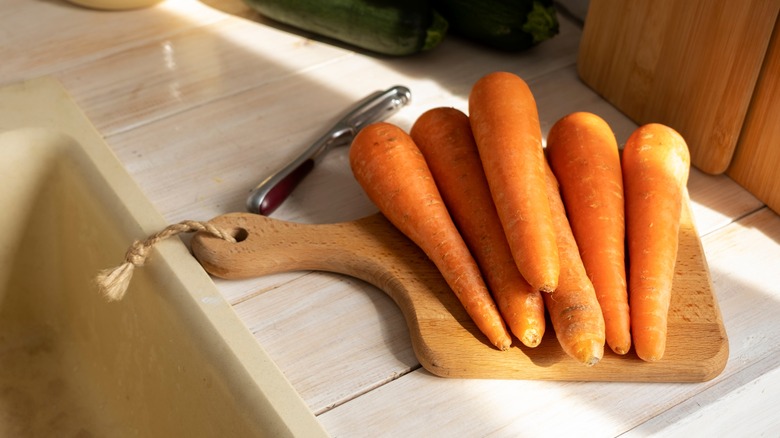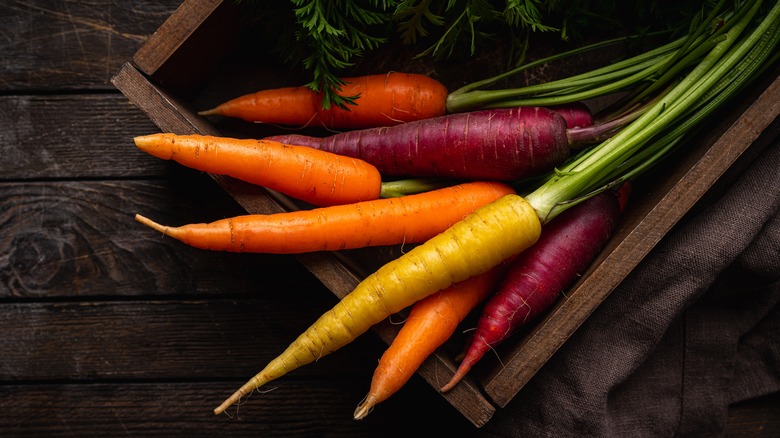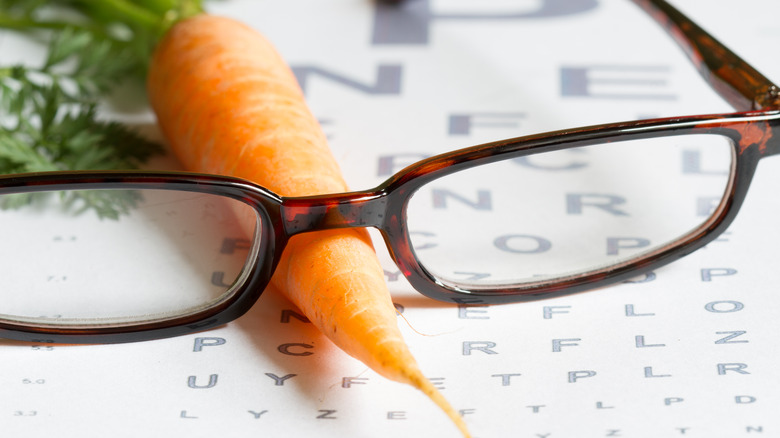False Facts About Carrots You Thought Were True
According to YouGov, carrots are the third most popular vegetable in the U.S. after potatoes and sweet corn. In fact, the consumption of fresh carrots in the country reached around 8.4 pounds per person in 2022 (via Statista). If a pound of carrots equates to around five medium-sized carrots, then on average, each person in the U.S. consumes approximately 42 carrots annually.
People enjoy eating carrots for a variety of reasons, including their satisfying crunch and their unique blend of sweet and earthy flavors. A key aspect of the appeal of this root vegetable also lies in its versatility. Carrots can be consumed raw as a snack or cooked in numerous ways, offering a range of textures and tastes to suit different preferences and culinary requirements. Carrots also offer a plethora of nutritional benefits. Not only are they low in calories and high in fiber but they are also loaded with vitamins and minerals.
There's little doubt that carrots are a valuable kitchen staple, yet there's more to them than meets the eye, and plenty of false facts about them that you might've thought were true. Eager to find out more and separate fact from fiction? Read on to unmask the real story behind this orange wonder.
False: All carrots are orange
Most supermarkets only stock orange carrots, reinforcing the misconception that the vegetable only comes in one color. In reality, carrots can be found in a variety of hues, each with its unique flavor profile and set of nutrients. Today, there are countless carrot types cultivated around the globe, with around 36 million tons of the vegetables produced each year. While orange carrots dominate the market, the crunchy vegetable can also be found in black, purple, white, red, and yellow, and are an easy way to add some color to your dish.
Historically, carrots were purple, white, or yellow. It wasn't until the 17th century that the orange carrot, as we know it today, entered the scene. The veggie likely gained its current appearance through selective breeding aimed at enhancing its taste and visual appeal. The carrot's color change is often attributed to Dutch growers who are said to have cultivated it in tribute to William of Orange, who led the struggle for Dutch independence, though this story may be more myth than fact. There's another theory that claims that carrots were brought to Europe by Islamic traders, with the vegetable already cultivated in Spain in the 14th century.
False: Baby carrots are specifically grown
Many imagine that baby carrots are harvested from the ground as miniature versions of their full-sized counterparts, or that there is something done to them in the growing process to ensure they are both perfectly shaped and bite-sized. But baby carrots aren't a natural phenomenon. Instead, they are the result of a process that transforms misshapen or oversized carrots into the tiny uniform carrots we find in grocery stores. The process of peeling and shaping cosmetically undesirable carrots into mini carrots doesn't just provide us with a convenient snack option but also reduces food waste by utilizing carrots that would otherwise be discarded.
Baby carrots were first developed in the 1980s by Mike Yurosek, a Californian farmer who wasn't happy about all the carrots that didn't make the cut solely due to aesthetics. His concept caught on fast, with the consumption of baby carrots increasing by 30% within a few years. Today, baby carrots are a staple on supermarket shelves, and the invention of baby carrots has led to a significant shift in the industry. According to Statista, in 2019, baby carrots made up 54% of the total carrot sales in the U.S., highlighting changing consumer preferences toward more convenient veggie options.
False: Eating carrots can cure vision problems
Carrots are often lauded for their ability to enhance eye health, thanks to their rich beta-carotene content. The body transforms this compound into vitamin A, essential for maintaining good eyesight. Carrots also contain lutein, an antioxidant that may help mitigate the development of macular degeneration, a condition that can negatively affect the vision of older adults. Nevertheless, the belief that eating carrots can cure existing vision problems is a gross exaggeration.
The myth that carrots improve vision might stem from World War II propaganda, intended to mislead the enemy about the reasons for the improved night vision of British pilots, which was actually due to the use of radar and not increased consumption of the vegetable. In reality, while eating carrots can be beneficial for maintaining a healthy cornea and vision, it won't reverse vision problems unless they stem from a deficiency in vitamin A. Notably, there are plenty of other foods that are rich in nutrients beneficial for eye health, such as sweet potatoes, fish, nuts, and legumes.
False: Carrots are only good for your eyes
There's little doubt that the antioxidants in carrots are beneficial for your eye health, but the humble carrot has many more health benefits that can contribute to overall well-being beyond its ability to support healthy vision. Aside from antioxidants including beta-carotene, alpha-carotene, lutein, and lycopene, carrots are also a rich source of vitamins B6, and K1, biotin, fiber, and potassium.
The nutrients in carrots can have numerous health benefits, including lowering the risk of various chronic diseases, including heart issues, age-related degenerative diseases, and even cancer. Carrots have also been credited with lowering cholesterol, boosting the immune system, and strengthening bones. Additionally, the high fiber content in carrots can promote a healthy digestive tract, aiding in the prevention of constipation. Coupled with a low-calorie content, the fiber in carrots can also aid in weight loss management by creating a sense of fullness.
False: Raw carrots are more nutritious than cooked carrots
The nutritional value of raw and cooked vegetables can vary significantly depending on the veggie type. This is because cooking some vegetables, such as broccoli and watercress, can lead to a loss of healthy enzymes. The same can be said for garlic, which loses health-boosting allicin when it's subjected to heat. However, carrots do not fall into this category, and their nutritional value isn't compromised during cooking.
A study featured in the Journal of Agricultural and Food Chemistry revealed that subjecting carrots to heat actually heightens their levels of beta-carotene, an antioxidant that plays a crucial role in human health. For optimal results, it's best to boil or steam carrots, rather than fry them, as highlighted by the research study. It's not all good news, however. On the downside, cooking carrots leads to the loss of polyphenols, a group of compounds credited with lowering blood pressure, reducing the risk of heart disease, and promoting healthy digestion and brain function.
False: Carrots should never be frozen
Not all vegetables freeze well. Once thawed, veggies with a high water content tend to become soggy and lose their crisp texture. Therefore, it's generally not advisable to freeze vegetables like lettuce and cucumber. On the other hand, carrots, which have a lower water content, are less likely to undergo textural changes when frozen. In addition, according to a study featured in the Journal of Food Composition and Analysis, there are no significant differences between the nutritional composition of fresh and frozen vegetables. The research suggests that frozen vegetables may even have a higher nutrient density.
To ensure that carrots retain their maximum flavor and nutritional value during the freezing process, it's important to use fresh vegetables. To minimize deterioration in flavor and texture, blanch the carrots in boiling water before placing them in a bowl of ice water. After drying thoroughly, flash-freeze the carrots on a flat surface. Once solid, transfer the vegetables into a resealable bag to both protect them and maximize freezer space. Blanched carrots have a freezer shelf life of up to 12 months.
False: Carrots need to be peeled
The belief that the outer layer of carrots needs to be peeled before consumption stems from concerns about the removal of dirt, bacteria, or pesticides that might be present on the skin. Additionally, carrot skin can be slightly tougher and can have a different taste than the vegetable's flesh, which is softer and sometimes considered sweeter.
In reality, unless you don't like the taste or texture of the carrot skin, there's very little reason for peeling it. Although carrots are grown in the ground, they're usually thoroughly cleaned by the time they reach consumers. As such, washing carrots under running water and using a brush to scrub their surface before cooking is usually enough to clean them from any residual grime. Just think of all the time you will save not having to peel your carrots now.
Significantly, it's the carrot's skin that holds the majority of the vegetable's nutritional value. For instance, the carrot's outer layer contains 80% of the root's beta-carotene, as well as a lot of its other beneficial compounds like vitamin C, vitamin B3, and phytonutrients. If you do happen to peel your carrots, why not incorporate the peels into your cooking so as not to lose their health benefits? Carrot peelings can be turned into chips, used in stock, pestos, and soups, and even utilized as a garnish to spruce up a dish.
False: Eating carrots will result in weight gain
Not all vegetables are ideal for weight management, and those looking to shed a pound or two probably shouldn't overindulge in calorie-rich veggies such as potatoes, corn, and peas in excessive quantities. When it comes to carrots, however, the belief that they can cause weight gain is largely unfounded.
Despite their somewhat high sugar content, carrots are low in calories and high in fiber, which can help weight management by promoting a feeling of fullness and reducing overall calorie intake. This significant fiber content not only aids in digestion but also helps maintain a steady blood sugar level, preventing the spikes and crashes that can cause overeating. A cup of the colorful veggie contains five grams of fiber, which equates to 18% of the recommended daily intake for adults. Furthermore, carrots only contain 50 calories per cup, which equates to just 2.5% of the daily calorie intake for women and 2% for men.
False: Carrots are poisonous to dogs
The list of foods that are toxic to dogs seems endless, and it can be a real minefield for pet owners. From chocolate and macadamia nuts to onions and garlic, there are plenty of things owners have to ensure their four-legged friends don't consume. While many foods are best kept off your dog's menu, however, carrots aren't one of them.
There's a good reason why carrots are a common ingredient in dog food and treats. Aside from being sweet and crunchy, carrots also add nutritional value to a dog's diet. Plus, their low calorie and high fiber content makes them great for digestive health. Additionally, carrots are an excellent source of vitamin A and antioxidants. These nutrients are great for maintaining your dog's vision, as well as promoting healthy skin and a shiny coat. Furthermore, carrots contain vitamin K, potassium, vitamin B6, calcium, and iron, which can contribute to the overall health and well-being of your dog. Lastly, carrots can also help improve a dog's dental health by acting as a natural abrasive. For a longer-lasting and healthy dog chew, you can freeze a whole carrot and give it to your dog to enjoy. The American Kennel Club also suggests frozen carrots can ease teething pain for puppies.









